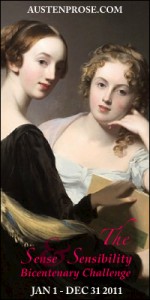[amazon_image id=”9626343613″ link=”true” target=”_blank” size=”medium” class=”alignleft”]Sense And Sensibility (Naxos AudioBooks)[/amazon_image]This morning on my way to school, I finished listening to the Naxos Audio recording of [amazon_link id=”9626343613″ target=”_blank” ]Sense and Sensibility[/amazon_link] by Jane Austen read by Juliet Stevenson. I first read S&S 1998 and again in 2010, and it was a treat to re-read. I particularly loved Elinor this time around.
If you have not read the book, it is the only Austen novel I can think of with two female protagonists, though it could be argued the protagonist is really Elinor more than Marianne. I like Elinor so much. I want to be her when I grow up. Anyway, Elinor and Marianne are the two Dashwood sisters turned out of their home, Norland Park, after their father died and their elder brother inherited the estate and was convinced by his horrible wife Fanny not to provide much for his stepmother and sisters. Meanwhile, Fanny’s brother Edward Ferrars visits Norland, and he and Elinor form what looks to all around them like an attachment. The Dashwood women are offered a cottage in Barton by Sir John Middleton, a relation. Marianne meets dashing John Willoughby and considers him a kindred spirit and soulmate even as she captures the heart of Colonel Brandon. However, both women are disappointed in their love affairs, and it is their responses to their disappointments and their consideration of others that forms the basis of most of the novel.
Sense and Sensibility is one of my favorite novels of all time, and is in my top three Austen novels (alongside Pride and Prejudice and Persuasion). Each time I turn to any of these novels, I feel I’m sitting down with an old friend. I feel at home. I think Austen does an excellent job with characterization. I did find myself wondering (yet again) what made Edward Ferrars so attractive to Elinor. Hugh Grant does an excellent job bringing life to that character in the 1995 film. I found I liked the idea of her marrying Colonel Brandon and wondered why he wasn’t sensible enough to see how wonderful she was, but as neither of them was interested in the other, perhaps it was for the best. Marianne grated on me a little more this time, perhaps because I am now 40 years old instead of my mid-20’s when I read the book last time, and I found her too immature and dramatic. I know—she’s supposed to be; that was rather the point. I do love the character names in this book, too. Just a touch of the exotic.
Juliet Stevenson is an excellent narrator. I love her characterization of Mrs. Jennings, and she does an excellent job reading Elinor and Marianne, too. They sound just like they should sound. I had the feeling that Stevenson was rather trying to imitate Elizabeth Spriggs, who played Mrs. Jennings in the 1995 production of [amazon_link id=”0800141660″ target=”_blank” ]Sense & Sensibility[/amazon_link]. She certainly sounded like Spriggs to me. I had previously listened to Stevenson read [amazon_link id=”9626344369″ target=”_blank” ]Persuasion[/amazon_link] (review), which I also loved. Stevenson also reads versions of [amazon_link id=”962634394X” target=”_blank” ]Emma[/amazon_link], [amazon_link id=”962634427X” target=”_blank” ]Northanger Abbey[/amazon_link], and [amazon_link id=”9626344679″ target=”_blank” ]Mansfield Park[/amazon_link] for Naxos, but, curiously, not [amazon_link id=”9626343567″ target=”_blank” ]Pride and Prejudice[/amazon_link]. She’s an excellent narrator, and if you can snag one of her Austen recordings, you won’t regret it.
I wonder if anyone can answer me this question (particularly if you’re British). I noticed that Stevenson pronounces the word “further” like “farther” and “farther” like “further” (so their sounds are switched) and says “sprung” for “sprang” and the like. Is that a dialect? Or is that considered the proper way to pronounce those words? I thought it was odd because it introduces confusion where there need be none. If it’s a dialect, I get it, but if it’s accepted pronunciation, that seems like a strange language quirk to me.
I reread this novel for the Sense and Sensibility Bicentenary Challenge. It was actually published 200 years ago this month, so how appropriate did it turn out to be, after all, that I waited until almost the end of the year to start this particular challenge?
Rating:












